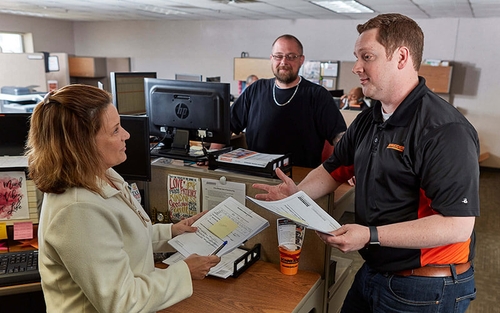Estimated reading time: 2 minutes
Navigating different work styles, communication preferences and attitudes in the office can be challenging. However, learning how to work with different personalities can be rewarding both personally and professionally.
With the right strategies and mindset, it's possible to build effective relationships and work productively with all of your coworkers. Follow these eight tips to foster a more collaborative work environment when you’re dealing with different personalities in the office.
8 tips for working with different personalities
1. Practice active listening.
Listening is a key component of effective communication in the workplace.
Active listening involves:
- Paying attention to what the other person is saying.
- Asking clarifying questions.
- Showing genuine interest in the conversation.
This approach to listening will help you build trust and foster better relationships with your team members.
2. Adjust your communication style.
Adapting to different personalities is crucial to maintaining positive work relationships. Part of that means adjusting your communication style based on who you're talking to.
For example, you may be more casual when you’re talking to certain coworkers, while with others, you’re more formal and direct. Learn how your coworkers prefer to communicate and change your tone accordingly.
Doing so can make a big difference in how well you get along with others.
3. Communicate clearly.
Communication style isn’t the only key to effectively dealing with different personalities in the workplace.
You also need to make sure you’re very clear with what you say to your colleagues to avoid any misunderstandings. Do this by:
- Using clear and concise language.
- Avoiding jargon.
- Asking questions to ensure everyone is on the same page.
Remember to adjust your tone and volume depending on the situation.
4. Develop empathy.
Empathy is the ability to understand and share the feelings of others. It's important to put yourself in the shoes of your coworkers and understand where they’re coming from.
This helps build rapport and creates a better workplace culture.
5. Find common ground.
An important step to take when communicating with different personality types is to find common ground. This can be difficult to do, but it's important to try. Start with:
- Making small talk.
- Sharing interests or experiences.
- Discussing areas you agree on.
Pointing out your similarities rather than your differences can help create more productive collaboration among teams. It can also lead to a more positive discussion when you get to a problem-solving stage.
6. Respect people’s differences.
Everyone has different values, beliefs and perspectives. Respecting these differences creates a more inclusive work environment where everyone feels valued and appreciated.
This makes people more comfortable to bring their ideas to the table, which leads to:
- Better collaboration.
- Increased creativity.
- Improved problem-solving.
7. Seek feedback.
Asking coworkers with different personality types for their feedback can help you gain valuable insights into how to better communicate and work with them.
Listen to their suggestions and use them as tools for self-improvement. There’s always something to learn from people who think differently than you do.
8. Stay positive.
Positivity is contagious. Even if you’re dealing with difficult personalities, maintaining a positive can-do attitude can inspire others to do the same.
Remember to focus on the solutions, not the problems.






